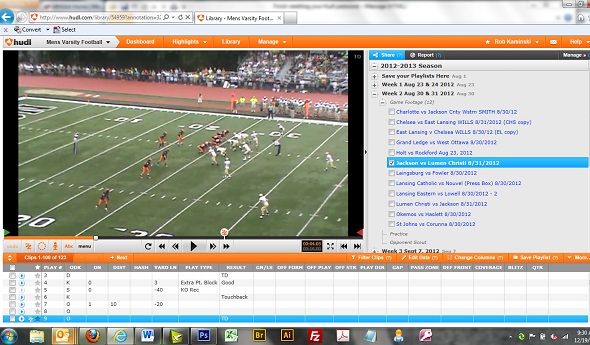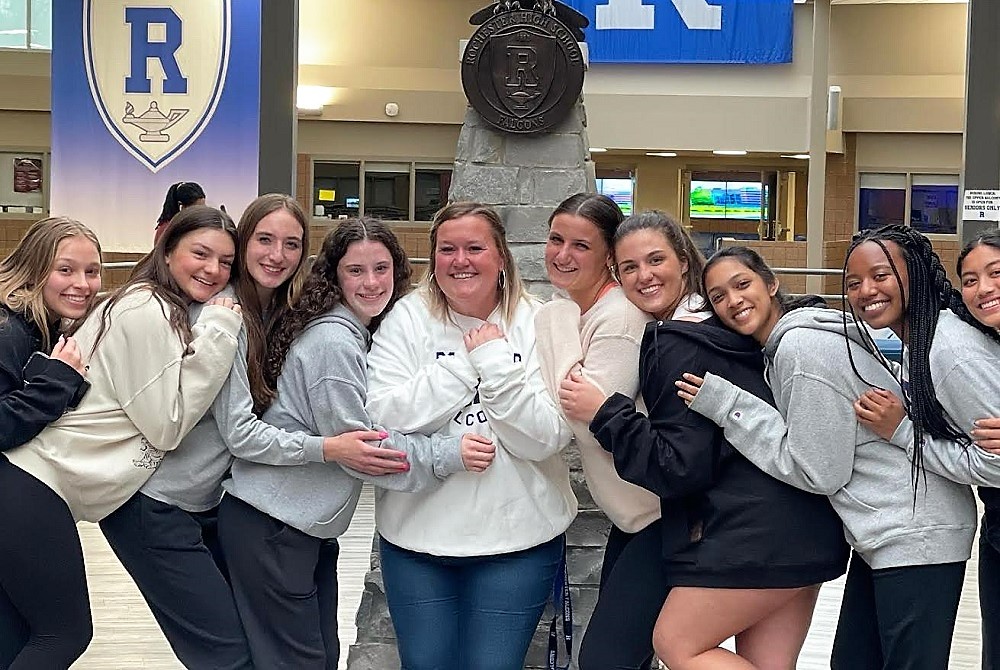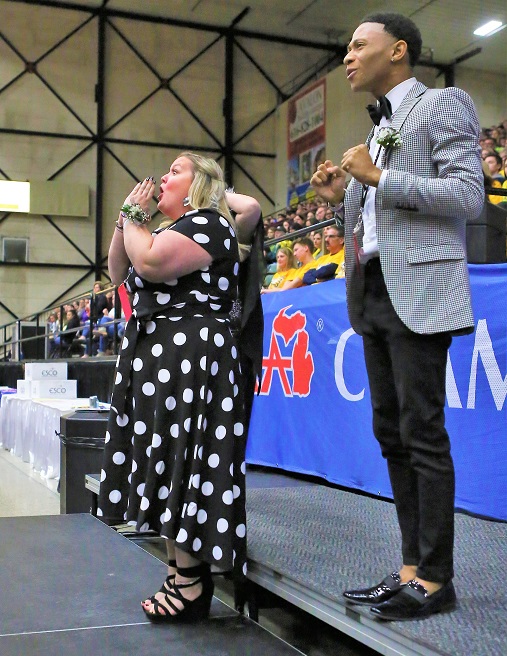
The Changing Face(book?) of Coaching
March 26, 2013
By Rob Kaminski
MHSAA benchmarks editor
From online video exchange programs such as hudl.com to social media platforms like Facebook, Twitter, and LinkedIn, the face of coaching and communicating with teams is ever-changing. How much is too much, and how are the new tools being used by the old guard?
With increasing frequency, today’s coaches are turning to technology to assist in their endeavors, particularly in video review and data compilation, as the number of programs available to them seems to grow on a daily basis.
Among the recent leaders, hudl.com seems to have won the favor of football coaches across the state, reducing video exchange and study to a couple clicks of the mouse.
Several members of the MHSAA Student Advisory Council report that their football coaches use the web-based program, and even local officials associations are using it for film study.
Similar programs are making it easier for today’s coaches to analyze data and compile statistics as well.
“The dispensing of information is much quicker than it used to be,” said Marshall bowling coach Sue Hutchings. “We use a scoring software for our stats.”
In more “visual” sports such as competitive cheer, online video is now essential.
“Video playback and feedback to athletes has helped the sport 10-fold,” said Middleville Thornapple-Kellogg coach Abby Kanitz.
In some cases, coaches are taking the lead on such initiatives.
“I run the MISCA (Michigan Interscholastic Swim Coaches Association) website and receive plenty of positive feedback about us posting meet results and top times reports,” said Bloomfield Hills Andover coach David Zulkiewski. “I also visit MHSAA.com weekly. Since I run the MISCA website, I want to make sure I have accurate and up-to-date information posted.”
Technology has also made the world a bit “greener” even in the small corner that is interscholastic athletics. From the required MHSAA rules meetings moving to an online format, to volumes of data now stored on flash drives rather than in file cabinets, coaches are realizing savings in both time and cost.
“The current state of track and field and cross country is so much more manageable than when I began,” said East Kentwood’s Dave Emeott. “I remember compiling actual papers from all over the state to keep track of the opposition, and now thanks to Athletic.net we have this access at the tip of our fingers. These programs have also replaced nights spent inputting data and record-keeping. I am sure I have replaced all that time elsewhere, but it is probably spent with kids and not with data.”
With the saturation and availability of these reports around the clock also comes temptation for those who are driven, and even obsessed, with such numbers. Coaches can rank near the top of that list.
“Technology can be extremely helpful and time-saving for coaches and teachers,” said Grand Haven wrestling coach James Richardson. “But, the disadvantage is the coaches and athletes have a more difficult time getting away from the sport, as we have access to so much information, and others have more access to us. This can lead to too much time being devoted to our sport.”
It also might even take some of the fun out of the actual competition.
“I think the one negative side of technology is the lack of the unknown,” Emeott said. “There was a day when we would enter a meet and not really know how the day would turn out. Now I have most meets scored within 10 points the day before we arrive.”
At times, such advance information also can lead to overconfidence heading into competition.
“Currently the MHSAA Final draw is posted online, and my players often see it and draw their own conclusions before I have a chance to talk to them about it,” said Allegan tennis coach Gary Ellis. “In the past, I was able to present their draw in the light in which I wanted them to see it.”
Another side effect is the indirect push to play beyond high school.
“There is a lot more social promotion and glamourizing of the athletes,” said Mike Van Antwerp, Holt lacrosse coach. “The recruiting pressure has increased tremendously, which is causing kids to commit earlier and go to great lengths to have a chance at being recruited.”
The world has indeed become a smaller, more familiar place. Not only can students and coaches learn pertinent statistics relating to any given opponent, they can also learn personal information about their competition through the deluge of social media vehicles.
It is in this realm where the greatest divide exists between coaches and their athletes when the subject of technology comes up.
Several members of the MHSAA Student Advisory Council indicate that their coaches do not use social media to assist with the daily activities involved with their sport, while others are but only on a limited basis.
It’s not that the coaches don’t know about Facebook, Twitter, LinkedIn, or the other platforms. More likely, they are all too well versed in the abuses of such mediums by young adults not yet ready to understand the lasting ramifications of a random tweet or damaging photo.
“We have specific rules for use of cell phones at practice, games, in the locker room, etc.,” said Diane Laffey, athletic director and coach at Warren Regina. “We also have a form for parents to sign if they want the coach to be able to text their daughter about practice or game cancellations or changes. We stress that the texting only be for necessary things, and the parents are to give permission.”
Safeguarding against the misuse of handheld devices is becoming as commonplace as handing out uniforms prior to the season.
“By rule, our players aren’t allowed to bring electronic devices to the court with them. We restrict cell phone usage at practice,” said Portage Central tennis coach Peter Militzer. “Players must ‘friend’ the coach on either Facebook or Twitter, and I monitor their activities to make sure their language and behavior meets our standards. We restricted a player’s opportunity to play on varsity last season due to excessive use of crude language and an offensive user name on Twitter.”
PHOTO: This is a screenshot from Hudl.com, an online service used by high school football coaches for video analysis and archiving.

Koehler Gives State Power Rochester Another Championship-Caliber Leader
By
Keith Dunlap
Special for MHSAA.com
December 8, 2022
ROCHESTER HILLS – Understandably, Rochester competitive cheer head coach Samantha Koehler might not know exactly the emotions she will feel Friday.
 After all, the occasion will mark a first in more than four decades with a Rochester program that’s historically been considered the gold standard in the state.
After all, the occasion will mark a first in more than four decades with a Rochester program that’s historically been considered the gold standard in the state.
When the Falcons compete at their first competition of the season at Troy, it will be the first time since 1981 that somebody other than the legendary Susan Wood will be at the helm of the program.
“Even with a change in leadership, we’re eager to show the world that Rochester cheer is back and better than ever,” Koehler said.
While there will probably be some nervousness, it also might be a relief to actually get into competition mode after an offseason of transition.
Following Rochester’s fifth-place finish in March at the Division 1 Final, Wood announced her retirement after 41 years as head coach.
All Wood (formerly Susan McVeigh) did during her tenure was lead Rochester to 14 MHSAA Finals championships and three runner-up finishes between 1994 and 2017.
She also led Rochester to five Michigan Cheerleading Coaches Association state titles and three runner-up finishes before competitive cheerleading became an MHSAA-sponsored sport in 1994.
In 36 out of 41 years with Wood in charge, Rochester competed in Finals of either MHSAA or MCCA state tournaments.
But rather than look at this as having to replace an irreplaceable legend, Koehler is looking at it as a chance to continue Rochester’s rich tradition – and such an opportunity was simply too good to pass up.
 “Yes, this position comes with a lot of high expectations and pressure,” Koehler admitted, while also praising the parents and team members who have helped make the transition easier. “But like George S. Patton, Jr. once said, pressure makes diamonds.”
“Yes, this position comes with a lot of high expectations and pressure,” Koehler admitted, while also praising the parents and team members who have helped make the transition easier. “But like George S. Patton, Jr. once said, pressure makes diamonds.”
Koehler has had plenty of success as well, having spent the last seven years as head coach at Plymouth High School, where she was named Michigan cheer Coach of the Year in 2020 after leading Plymouth to a runner-up finish in Division 1.
She also has served as the head cheerleading coach at Wayne State University and on the board for the state coaches association.
“We wanted somebody with experience that coached at a high level and had success at a high level, because that’s where we are,” Rochester athletic director Dean Allen said. “The bar is high, and keep it there. Just keep Rochester cheer as the preeminent program in the state of Michigan. That was our goal.”
Allen said the biggest challenge has been for Koehler to balance out bringing in her own ideas, but also maintaining traditions that have made the program what it is.
So far, so good.
“She’s been able to do that,” Allen said.
While the last few months have been all about getting to know her new team and community, the coming winter will be about trying to get Rochester back on top at the Finals in March.
The Falcons haven’t won Division 1 since 2017, and have seen city rivals Stoney Creek (in 2019) and Rochester Adams (2020 and 2021) claim the last three championships between them.
“We are fortunate enough to compete against two of the best teams in the state frequently throughout the season,” Koehler said. “Competing against Adams and Stoney betters our program by motivating athletes and coaches to be the best we can be each and every day. With such a talented and dedicated group of athletes, we are excited and eager to challenge our city rivals for that state championship.”
 Keith Dunlap has served in Detroit-area sports media for more than two decades, including as a sportswriter at the Oakland Press from 2001-16 primarily covering high school sports but also college and professional teams. His bylines also have appeared in USA Today, the Washington Post, the Detroit Free Press, the Houston Chronicle and the Boston Globe. He served as the administrator for the Oakland Activities Association’s website from 2017-2020. Contact him at [email protected] with story ideas for Oakland, Macomb and Wayne counties.
Keith Dunlap has served in Detroit-area sports media for more than two decades, including as a sportswriter at the Oakland Press from 2001-16 primarily covering high school sports but also college and professional teams. His bylines also have appeared in USA Today, the Washington Post, the Detroit Free Press, the Houston Chronicle and the Boston Globe. He served as the administrator for the Oakland Activities Association’s website from 2017-2020. Contact him at [email protected] with story ideas for Oakland, Macomb and Wayne counties.
PHOTOS (Top) Samantha Koehler, middle, is taking over the Rochester High competitive cheer program this season. (Middle) Koehler, with her Plymouth assistants, coach their team during the 2020 Division 1 Final. (Top photo courtesy of Dean Allen/Rochester Athletics. Middle photo by Hockey Weekly Action Photos.)

